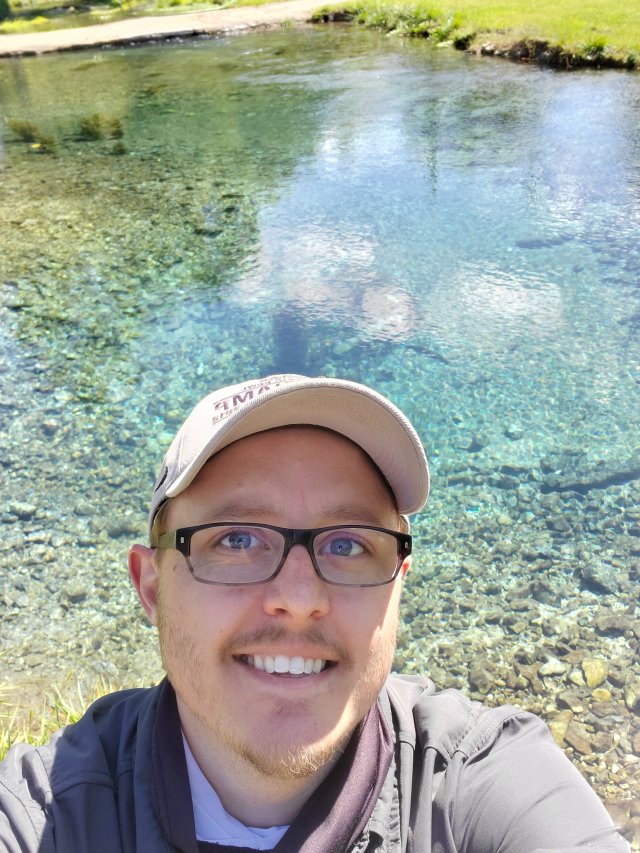Meet EPA Hydrologist Jon Fields

EPA hydrologist Jon Fields studies groundwater quality, quantity, and flow. His current research includes expanded use of geophysics for characterizing an Enhanced Aquifer Recharge (EAR) site, application of electrical resistivity imaging (ERI) to a variety of sites and geologies across the US and experimenting with the use of transient ERI (TERI) for monitoring groundwater flow in karst. He is also collaborating with other EPA researchers to study the effects of climate change and sea-level rise on remediation technologies at contaminated sites.
Tell us about your background.
Being raised in southwest Oklahoma, it was natural to attend Oklahoma State University where I obtained B.Sc. and M.Sc. degrees in geology with a focus on hydrogeology. Most of my research background revolves around ERI and karst (a type of landscape where the dissolving of the bedrock has created sinkholes, sinking streams, caves, springs, and other characteristic features). I worked in the Arbuckle Simpson Aquifer on an undergraduate thesis evaluating the electrical resistivity variability within the aquifer, comparing specific gravity measurements to ERI data. My graduate thesis was in the Hydrogeophysical Characterization of Swine Lagoon Effluent Amended Soils in Mantled Karst at a field site within the Buffalo National River watershed near Mt. Judea, Arkansas.
When did you first know you wanted to be a scientist?
I was an artistic child and loved art throughout my schooling. The first time I can recall being more interested in science was my freshman year in high school. Mr. Adams was a man of the earth with a knack for science. As my biology teacher at Lawton High School, he stirred my passion for science and from then on, I enrolled in advanced science and math classes. However, my mom would likely say I was interested in protecting the environment from a young age. She often recalls a story of me crying in a grocery store parking lot, after chasing plastic bags in the wind and being upset that I couldn’t capture all the loose litter.
What do you like most about your research?
Even though the technology is over a century old and employed in other disciplines, ERI is relatively new to many in the environmental science space. I enjoy displaying what the technology can do and trying to improve conceptual site models at research sites.
How does your science matter?
I believe my science allows the environmental science space to be on par with other disciplines which utilize similar technologies. In the energy sector, boreholes are rarely drilled without first conducting some level of subsurface imaging. Similarly, doctors don’t operate without first scanning the body. My science, collecting non-invasive surface geophysical data, allows project managers to make an informed decision before breaking ground at their site, ultimately saving time and money.
If you weren’t a scientist, what would you be doing?
I enjoy the human condition. I would likely find a way of working with people as a policy advocate, and/or explore my more artistic side.
What advice would you give a student interested in a career in science?
What’s more important than your degree is how multi-faceted you make yourself. Students should worry less about getting a specific degree to do a certain job. Many companies will train you to do exactly what’s needed for the job. Focus on learning, taking courses in different disciplines, and improving one’s work ethic.
If you can have any superpower, what would you choose?
I would like the same power as Saitama from One Punch Man: unparalleled physical prowess, supernatural reflexes and senses, and invulnerability. He’s nonchalant and humble, and acquired his strength through diligence and perseverance. Those are things I don’t have a good handle on, but I feel like this would solve any problem and I’m a huge fan.
What do you think the coolest scientific discovery was and why?
Electricity. So many other inventions have come from this initial finding: Alessandro Volta, Michael Faraday, Alexander Graham Bell, Thomas Edison, and Nikola Tesla all came after the discovery and have each contributed their own groundbreaking invention from electricity.
You are stranded on a desert island; how do you use science to survive?
I know very little about actual survival, but I know plenty about water and that you require water to survive. My first goal would be to hand dig a well near the center of the island until I reached groundwater where I’d likely find a freshwater lens.
What do you think is our biggest scientific challenge in the next 20/50/100 years?
Sustainable energy production and storage. I perceive our current chokepoint exists in practical energy storage on a municipality scale. Storage facilities of the future must withstand extreme heat, extreme cold, extreme precipitation, and manage continued strain on the system for 20+ years without requiring replacement. What makes this difficult is maintaining affordability.
Editor's Note: The opinions expressed herein are those of the researcher alone. EPA does not endorse the opinions or positions expressed.
